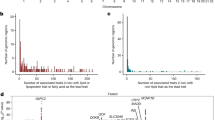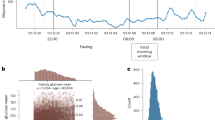Abstract
Background/Objectives
To assess the reproducibility and validity of a Toronto-modified Harvard food frequency questionnaire (FFQ) among a multi-ethnic sample of young adults.
Subjects/Methods
A total of 150 participants recruited from the Toronto Nutrigenomics and Health Study cohort who had existing dietary intakes assessed by FFQ (FFQ1) and reassessment one year later (FFQ2). Of these, 100 participants also completed a three-day food record to evaluate the validity of the FFQ for 38 nutrients (energy, 14 macronutrients, 22 micronutrients, and 1 bioactive). Analyses were also stratified between the two major ethnic groups (Caucasian and East Asian).
Results
Among the full sample, mean intakes of most nutrients (27/38) did not differ significantly between estimates derived from FFQ2 compared to the three-day food record. Energy, sex, and ethnicity adjusted deattenuated Pearson correlation coefficients ranged from 0.20 to 0.92 (mean r = 0.52 ± 0.15), and 34/38 validity coefficients were r ≥ 0.32. Gross misclassification of intakes between FFQ2 and the three-day food record was low (<6%), but energy, polyunsaturated fatty acids (PUFA), and sodium were underestimated by FFQ2. Mean intakes between FFQ1 and FFQ2 did not differ significantly for any nutrient. Between the two major ethnic groups, mean validity coefficients were similar, but varied for individual nutrients with saturated fat, PUFA, and omega 3 being among the most discrepant.
Conclusions
Compared to a three-day food record, the Toronto-modified Harvard FFQ is a reproducible and valid tool to estimate dietary intake among a multi-ethnic sample of young adults. However, incorporation of protocols to improve the assessment of culturally diverse diets should be considered.
This is a preview of subscription content, access via your institution
Access options
Subscribe to this journal
Receive 12 print issues and online access
$259.00 per year
only $21.58 per issue
Buy this article
- Purchase on Springer Link
- Instant access to full article PDF
Prices may be subject to local taxes which are calculated during checkout

Similar content being viewed by others
Data availability
The datasets generated during and/or analysed during the current study are available from the corresponding author on reasonable request.
References
Blanchard CM, Chin MK, Gilhooly CH, Barger K, Matuszek G, Miki AJ, et al. Evaluation of PIQNIQ, a Novel Mobile Application for Capturing Dietary Intake. J Nutr. 2021;151:1347–56.
Neuhouser ML, Tinker L, Shaw PA, Schoeller D, Bingham SA, Horn LV, et al. Use of recovery biomarkers to calibrate nutrient consumption self-reports in the Women’s Health Initiative. Am J Epidemiol. 2008;167:1247–59.
Shim JS, Oh K, Kim HC. Dietary assessment methods in epidemiologic studies. Epidemiol Health. 2014;36:e2014009.
Carroll RJ, Midthune D, Subar AF, Shumakovich M, Freedman LS, Thompson FE, et al. Taking advantage of the strengths of 2 different dietary assessment instruments to improve intake estimates for nutritional epidemiology. Am J Epidemiol. 2012;175:340–7.
Freedman LS, Commins JM, Moler JE, Willett W, Tinker LF, Subar AF, et al. Pooled results from 5 validation studies of dietary self-report instruments using recovery biomarkers for potassium and sodium intake. Am J Epidemiol. 2015;181:473–87.
Molag ML, de Vries JH, Ocke MC, Dagnelie PC, van den Brandt PA, Jansen MC, et al. Design characteristics of food frequency questionnaires in relation to their validity. Am J Epidemiol. 2007;166:1468–78.
Dahm CC. Correcting measurement error in dietary exposure assessments: no piece of cake. Am J Clin Nutr. 2020;112:11–2.
Kirkpatrick SI, Baranowski T, Subar AF, Tooze JA, Frongillo EA. Best practices for conducting and interpreting studies to validate self-report dietary assessment methods. J Acad Nutr Diet. 2019;119:1801–16.
Kirkpatrick SI, Vanderlee L, Raffoul A, Stapleton J, Csizmadi I, Boucher BA, et al. Self-report dietary assessment tools used in Canadian research: A scoping review. Adv Nutr. 2017;8:276–89.
Subar AF, Thompson FE, Kipnis V, Midthune D, Hurwitz P, McNutt S, et al. Comparative validation of the Block, Willett, and National Cancer Institute food frequency questionnaires: The Eating at America’s Table Study. Am J Epidemiol. 2001;154:1089–99.
Willett WC, Sampson L, Stampfer MJ, Rosner B, Bain C, Witschi J, et al. Reproducibility and validity of a semiquantitative food frequency questionnaire. Am J Epidemiol. 1985;122:51–65.
Rimm EB, Giovannucci EL, Stampfer MJ, Colditz GA, Litin LB, Willett WC. Reproducibility and validity of an expanded self-administered semiquantitative food frequency questionnaire among male health professionals. Am J Epidemiol. 1992;135:1114–26.
Nath SD, Huffman FG. Validation of a semiquantitative food frequency questionnaire to assess energy and macronutrient intakes of Cuban Americans. Int J Food Sci Nutr. 2005;56:309–14.
Brenner DR, Boucher BA, Kreiger N, Jenkins D, El-Sohemy A. Dietary patterns in an ethnoculturally diverse population of young Canadian adults. Can J Diet Pr Res. 2011;72:e161–8.
Jenkins DJA, Boucher BA, Ashbury FD, Sloan M, Brown P, El-Sohemy A, et al. Effect of current dietary recommendations on weight loss and cardiovascular risk factors. J Am Coll Cardiol. 2017;69:1103–12.
Glenn AJ, Boucher BA, Kavcic CC, Khan TA, Paquette M, Kendall CWC, et al. Development of a portfolio diet score and its concurrent and predictive validity assessed by a food frequency questionnaire. Nutrients. 2021;13:2850.
Toronto Public Health. T.O. Health Check. August, 2019. Available at: https://www.toronto.ca/wp-content/uploads/2019/11/92ef-TOHealthCheck_2019.pdf.
Statistics Canada. Focus on Geography Series, 2016 Census. Statistics Canada Catalogue no. 98-404-X2016001. Ottawa, Ontario. Data products, 2016 Census. 2017. Available at: https://www12.statcan.gc.ca/census-recensement/2016/as-sa/fogs-spg/Facts-can-eng.cfm?Lang=Eng&GK=CAN&GC=01&TOPIC=1.
Garcia-Bailo B, Brenner DR, Nielsen D, Lee HJ, Domanski D, Kuzyk M, et al. Dietary patterns and ethnicity are associated with distinct plasma proteomic groups. Am J Clin Nutr. 2012;95:352–61.
McCullough ML, Wang Y, Hartman TJ, Hodge RA, Flanders WD, Stevens VL, et al. The Cancer Prevention Study-3 FFQ is a reliable and valid measure of nutrient intakes among racial/ethnic subgroups, compared with 24-hour recalls and biomarkers. J Nutr. 2021;151:636–48.
Kristal AR, Feng Z, Coates RJ, Oberman A, George V. Associations of race/ethnicity, education, and dietary intervention with the validity and reliability of a food frequency questionnaire: The Women’s Health Trial Feasibility Study in Minority Populations. Am J Epidemiol. 1997;146:856–69.
Holmes MD, Powell IJ, Campos H, Stampfer MJ, Giovannucci EL, Willett WC. Validation of a food frequency questionnaire measurement of selected nutrients using biological markers in African-American men. Eur J Clin Nutr. 2007;61:1328–36.
Labonte ME, Cyr A, Baril-Gravel L, Royer MM, Lamarche B. Validity and reproducibility of a web-based, self-administered food frequency questionnaire. Eur J Clin Nutr. 2012;66:166–73.
Willett WC, Howe GR, Kushi LH. Adjustment for total energy intake in epidemiologic studies. Am J Clin Nutr 1997;65(4 Suppl):1220S–8S. discussion 9S-31S.
Willett WC Nutritional epidemiology. 3rd ed. New York: Oxford University Press; 2012.
Ahn Y, Kwon E, Shim JE, Park MK, Joo Y, Kimm K, et al. Validation and reproducibility of food frequency questionnaire for Korean genome epidemiologic study. Eur J Clin Nutr. 2007;61:1435–41.
Baddour SE, Virasith H, Vanstone C, Forest JC, Giguere Y, Charland M, et al. Validity of the Willett food frequency questionnaire in assessing the iron intake of French-Canadian pregnant women. Nutrition 2013;29:752–6.
Abdelmagid SA, Nielsen DE, Badawi A, El-Sohemy A, Mutch DM, Ma DW. Circulating concentrations and relative percent composition of trans fatty acids in healthy Canadian young adults between 2004 and 2010: a cross-sectional study. CMAJ Open 2017;5:E130–E6.
Stram DO, Hankin JH, Wilkens LR, Pike MC, Monroe KR, Park S, et al. Calibration of the dietary questionnaire for a multiethnic cohort in Hawaii and Los Angeles. Am J Epidemiol. 2000;151:358–70.
Mayer-Davis EJ, Vitolins MZ, Carmichael SL, Hemphill S, Tsaroucha G, Rushing J, et al. Validity and reproducibility of a food frequency interview in a Multi-Cultural Epidemiology Study. Ann Epidemiol. 1999;9:314–24.
Cui Q, Xia Y, Wu Q, Chang Q, Niu K, Zhao Y. Validity of the food frequency questionnaire for adults in nutritional epidemiological studies: A systematic review and meta-analysis. Crit Rev Food Sci Nutr. 2021. https://doi.org/10.1080/10408398.2021.1966737.
Serra-Majem L, Frost Andersen L, Henrique-Sanchez P, Doreste-Alonso J, Sanchez-Villegas A, Ortiz-Andrelluchi A, et al. Evaluating the quality of dietary intake validation studies. Br J Nutr. 2009;102(Suppl 1):S3–9.
Kelemen LE, Anand SS, Vuksan V, Yi Q, Teo KK, Devanesen S, et al. Development and evaluation of cultural food frequency questionnaires for South Asians, Chinese, and Europeans in North America. J Am Diet Assoc. 2003;103:1178–84.
McLean RM, Farmer VL, Nettleton A, Cameron CM, Cook NR, Campbell NRC, et al. Assessment of dietary sodium intake using a food frequency questionnaire and 24-hour urinary sodium excretion: A systematic literature review. J Clin Hypertens (Greenwich). 2017;19:1214–30.
Horne JR, Gilliland J, Madill J. Assessing the Validity of the Past-Month, Online Canadian Diet History Questionnaire II Pre and Post Nutrition Intervention. Nutrients. 2020;12:1454.
Thorpe MG, Kestin M, Riddell LJ, Keast RS, McNaughton SA. Diet quality in young adults and its association with food-related behaviours. Public Health Nutr. 2014;17:1767–75.
Rhee JJ, Sampson L, Cho E, Hughes MD, Hu FB, Willett WC. Comparison of methods to account for implausible reporting of energy intake in epidemiologic studies. Am J Epidemiol. 2015;181:225–33.
Henriquez-Sanchez P, Sanchez-Villegas A, Doreste-Alonso J, Ortiz-Andrellucchi A, Pfrimer K, Serra-Majem L. Dietary assessment methods for micronutrient intake: a systematic review on vitamins. Br J Nutr. 2009;102(Suppl 1):S10–37.
Boucher B, Cotterchio M, Kreiger N, Nadalin V, Block T, Block G. Validity and reliability of the Block98 food-frequency questionnaire in a sample of Canadian women. Public Health Nutr. 2006;9:84–93.
Guasch-Ferre M, Bhupathiraju SN, Hu FB. Use of Metabolomics in Improving Assessment of Dietary Intake. Clin Chem. 2018;64:82–98.
Funding
Sources of Support: Advanced Foods and Materials Network (AFMNet).
Author information
Authors and Affiliations
Contributions
DEN collected, analysed and interpreted the data, and wrote and critically revised the manuscript. BAB modified the FFQ, contributed to the analytic plan, interpreted the data, and wrote and critically revised the manuscript. LD analysed the data and revised the manuscript. DJAJ designed the study, modified the FFQ, and critically revised the manuscript AE-S designed the study and critically revised the manuscript. All authors read and approved the final version of the paper.
Corresponding author
Ethics declarations
Competing interests
The authors declare no competing interests.
Additional information
Publisher’s note Springer Nature remains neutral with regard to jurisdictional claims in published maps and institutional affiliations.
Supplementary information
Rights and permissions
Springer Nature or its licensor holds exclusive rights to this article under a publishing agreement with the author(s) or other rightsholder(s); author self-archiving of the accepted manuscript version of this article is solely governed by the terms of such publishing agreement and applicable law.
About this article
Cite this article
Nielsen, D.E., Boucher, B.A., Da Costa, L.A. et al. Reproducibility and validity of the Toronto-modified Harvard food frequency questionnaire in a multi-ethnic sample of young adults. Eur J Clin Nutr 77, 246–254 (2023). https://doi.org/10.1038/s41430-022-01209-z
Received:
Revised:
Accepted:
Published:
Issue Date:
DOI: https://doi.org/10.1038/s41430-022-01209-z



